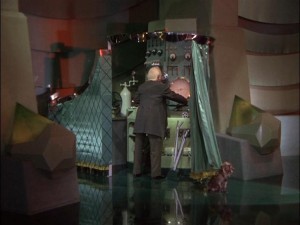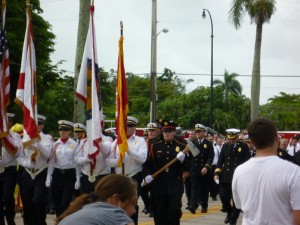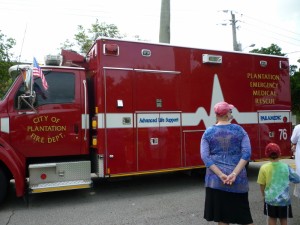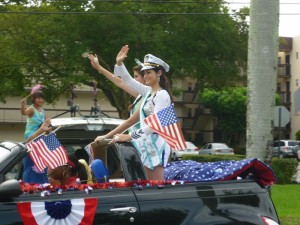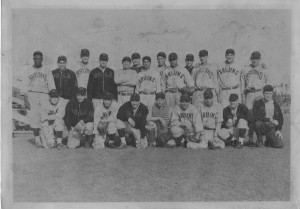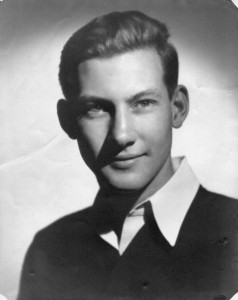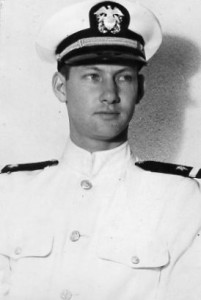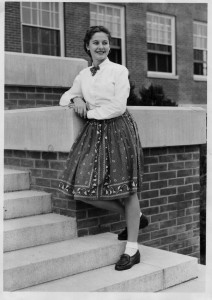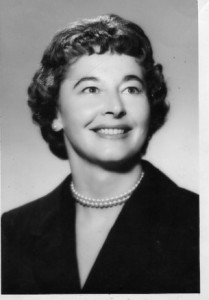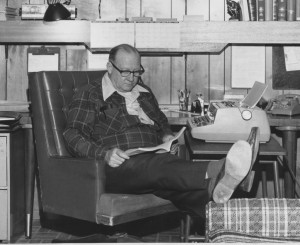James Scott Bell
“Don’t look back. Something may be gaining on you.” – Satchel Paige
Monthly Archives: July 2011
So this guy walks into a booksigning, and…
I’m going to take up from Michelle Gagnon’s terrific post on planning a book signing and pose a question: what is the funniest thing that has ever happened to you at a book signing? Either as the guest of honor or as an attendee? John Gilstrap tells HILARIOUS stories about doing a booksigning at Costco,involving the bay doors and a de facto wind tunnel. Sandra Brown also tells a great story about the first signing she ever did. What’s yours?
I don’t really have one. Well, yes I do. I did a signing at a local store and was all set up by the entranceway, showered, shaved and tap-dancing, and actually had people who weren’t related to me or in my circle of friends buying books. A guy — a big guy — walks through the door, sees me sitting there signing a book for a very nice lady, and rudely interrupts, asking “Where’s the music department?” I immediately responded, “Second floor. Turn right at the top of the escalator and go all the way back.” Of course, that was where the restrooms were located. For all I know, he’s still looking.
Your turn.
Giving Good Book Tour
In my last post, I mentioned that I was offering a seminar on book events at a writing conference. A few people requested that I post excerpts from what was, if I do say so myse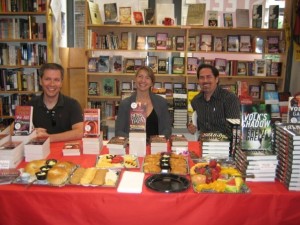 lf, a brilliant PowerPoint presentation (At least no one fell asleep. Well, the one guy who did wasn’t actually snoring until the very end).
lf, a brilliant PowerPoint presentation (At least no one fell asleep. Well, the one guy who did wasn’t actually snoring until the very end).
So here are my tips, in a somewhat random order:
The Basics:
Timing is everything, in life and especially in book tours. When planning yours, a few things to bear in mind…
3-6 months before your release date:
- Contact stores and libraries to set up your tour. There’s a strikingly long lead time for events at some venues, and it’s important to get on their calendar early
- Partner up (more on this later)
- Pitch a “theme” event (also, please see below)
- Convince the booksellers that you’ll be able to draw a crowd, then do your best to fill those seats. Get in touch with the local MWA and SinC chapters of whatever region you’re visiting, and ask nicely if they’d mind posting an announcement about your event. Work those social networks to make sure your followers know that you’ll be coming to their hometown. Call long lost relatives and demand that they show up and buy ten books to make up for that incident in 1992. Whatever it takes.
The week before your book hits shelves:
- Call a week before to check details. I learned this one the hard way, when my publicist gave me the wrong date for one event, and the wrong time for another. Hell hath no wrath like a bookseller who promoted an event that an author showed up to an hour late. Trust me, checking the details personally in advance can save everyone a lot of tears.
- Arrive at the venue at least fifteen minutes early to doublecheck the set-up, and (more importantly), to introduce yourself to every bookseller in the store
- ALWAYS bring extra books. The only times I haven’t also coincided with the times when I packed the place, the bookseller had only stocked a handful of copies, and they rapidly sold out. Times like that, most sellers are happy to buy the books from you on consignment.
- Remember to bring promotional materials (bookmarks, magnets, pens, etc.) I always tend to remember this one as I’m sitting on a plane, picturing the stack of bookmarks still sitting in a bag by my front door.
Partnering:
I loathe doing a book event by myself, I truly do. Whenever possible, I prefer to share the burden with at least one other author, which has led to some fascinating experiences with a cast of characters ranging from teddy bear aficionados to reformed bank robbers.
Offering an event with one or more other authors has some key benefits:
- You can interview each other, do a Q & A, or just talk up each others’ books, which tends to be much easier than lauding your own
- It’s easier to secure a book signing, since booksellers believe (rightly) that two authors are a better draw than one
- Cross-promotion; your fellow author’s fans learn about your books, and vice versa (and hopefully, they buy copies of both)
- Worst case scenario, if no one shows up, you have someone to play cards with
Another option to consider: set up an event with more “unconventional” partners. To date, one of my most successful events in terms of sales was at a cocktail party hosted by a friend. She invited me to sell books, a jewelry designer to sell jewelry, and a rep from a kid’s educational toy company to sell toys. And all of us sold out–people came prepared to spend money, and after a few glasses of wine they shopped like mad.
Theme Events:
Booksellers and readers both love novel experiences (no pun intended). If the subject matter of your book naturally lends itself to a theme, fantastic. If not, get creative. Here are some examples:
- Rhys Bowen hosted “Royal Tea Parties” at bookstores for the release of “Her Royal Spyness.”
- Kelli Stanley held the release party for her 1930’s era novel “City of Dragons” at a modern day Speakeasy.
- Heather Graham hosted a séance for “The Séance” release in Salem, Massachusetts.
So if your book involves classic cars, I’d recommend hitting at least as many car shows as bookstores. Same with any craft-related novels–get thee to quilting bees, scrapbooking parties, the works. The teddy bear guy (and no, I’m not making this up, there is a teddy bear guy, and he’s lovely), told me about teddy bear conferences where he’ll set up a table and sell a few thousand books in a single day.
My books don’t tend to have themes, outside of dirty bombs, kidnappings, and terrorists (and those terms don’t naturally lend themselves to mass attendance). At Thrillerfest one year, a group of us were discussing how tough it can be to land events in New York City bookstores.
The following year, we found a way around it– during Tfest, we organized a mass reading at a local Borders with the theme, “Quick Thrills from Out-of-Towners,” asked the extraordinarily gracious Lee Child to serve as our MC, and we managed to pack the place. Creativity can pay off.
In a nutshell, those are my top recommendations. But I’d be curious to hear from both authors and readers: what’s the best book event you ever attended, and what made it so great?
The Parade of Life
On Monday, July 4th, I came out of my writer’s cave to join the crowd lining the town streets and to watch our Independence Day Parade. My husband and I are at the stage where we look for new things to do. We have little to shop for and have been to most of the tourist sites around, so fairs and festivals often are a free and fun excuse to leave the house. Otherwise, it’s difficult to get me to emerge from my writing cave.
It’s easy to forget about the outside world when we’re immersed in our story, thinking up blog topics, or working on promo for the next release. Time can slip by. We have to remind ourselves to step out and smell the flowers, to watch the clouds scud by, and to cherish that moment as it will never come again. Imagining people and places in our minds is no substitute for the real thing, but it’s natural for writers to become isolated when we’re more at home with our characters than the outside world. But once these hours at our desks crawl past, we can never experience them again.
Good friends will call and coax us out of our caves to meet them for lunch or a coffee break. Otherwise, we have to force ourselves to get out of the house, to make a play date, to emerge into society. Usually, this short break recharges our creative batteries and we return to the computer refreshed. At the parade, I remembered how exhilarating it can be watching the motorcycle police zoom around on their vehicles, the firemen cruising past in their monstrous red trucks with sirens blaring, the legions of veterans with their funny hats drive by. Children scrambled for candy tossed onto the swales by parade drivers while families held tailgate parties, watching the parade from the back ends of their vans and SUVs. The steamy humidity made us all sweat and our skin itch, but we didn’t notice the discomfort. It was a joyous moment of feeling alive, of being united in our human experience.
Really, we full-time writers should get out more often. What do you do to push yourself out the door?
The Fourth and Celebration
By Kathleen Pickering
I could think of no better way to celebrate finishing a week in Manhattan attending the annual RWA conference than to sit on the Great South Bay with loved ones, applaud the spectacular sunset and watch fireworks.
For those of you unfamiliar to Long Island’s south shore (except for the recent disturbing news of serial killings along these marshes), let me assure you, these beaches are some of the best watering holes in the country.
As a child, I remember charging home from school on the last day before summer break to pile in the boat with my parents and motor to the town beach where I and my seven siblings lived for two, glorious months. Oh, the lost hours running barefoot along the dunes, fishing and clamming, bird-watching and shell hunting, tumbling in the Atlantic—because those waves certainly tossed small beings without effort, and camp fires at night—because back then, we could!
My parents were no fools taking us to the beach for the summer. It was like camp with no rules. My folks had just as much fun as we did. They taught us boating safety, and gave us freedom they’d never allow at home.
Can you imagine ten people living in close quarters, and loving every minute of it? To the surprise of many observers, we never had an accident. Not even a stitch. I honor my parents for giving us free reign to be kids while ensuring we understood and respected our surroundings.
You can imagine my delight in continuing my parent’s summer tradition when my husband and I bought our own sailboat and introduced our sons to beach living. Some of my siblings bought boats as well, so the beach became a second-generation family affair. Our sons grew up dockside with their cousins like brothers and sisters, forging bonds that will last their lifetime.
So, yesterday, coming “home” (since I now live in Fort Lauderdale) to spend the Fourth of July on my sister’s boat with her family, my family and dear friends, made me so very grateful for this wonderful event that is my life!
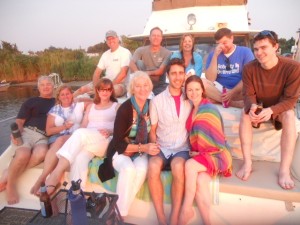 I sat with my sons, my new daughter in law, completely satisfied with the people they’ve become. Pop! Pop! Ahhhhhh! Fireworks!
I sat with my sons, my new daughter in law, completely satisfied with the people they’ve become. Pop! Pop! Ahhhhhh! Fireworks!
I caught up with friends I haven’t seen in months and shared news, like for me, RWA turned out to be another wonderful networking opportunity and and chance to hammer out three new proposals with my editor. Sizzle! Pop! Oooooh! More fireworks!
I also heard of some hardships loved ones are facing, that really, no one should face. Yet, watching them forget their troubles while fireworks lit the sky cemented gratitude in me for this time together. Swiiiishhhh! Pop! Boom! Even more fireworks!
So, for those of us with troubled times crowding our thoughts, I suggest taking a moment to let the kid in you enjoy the fireworks and celebration July Fourth offers. Heck, let the fireworks last all year long! After all, The Fourth celebrates our great nation overcoming oppression in pursuit of freedom to follow our dreams. For that I feel gratitude, right down to my toes. The child in me wants to ooooh, and ahhhh and remember never to forget how lucky we truly are!
Won’t you join me in celebrating? How did you spend The Fourth of July?
Rejection Remedies

- You can send your manuscript there without suffering waves of anxiety regarding the eventual fate of your submission. You know with 100% certainty that it will not be accepted for publication.
- There are no page fees.
- You may claim to have submitted to the most prestigious journal (judged by acceptance rate)
- The JofUR is a one-of-a-kind. Merely submitting work to it may be considered a badge of honor.
- Decision are often (though not always) rendered within hours of submission.
For Mom and Dad on the Fourth
This explains, I think, why my books all have a quest for justice in them. I learned to respect that quest from Dad.
Here’s the way I remember him best––sitting in his home office reading advance sheets with the latest case law. He was the leading search and seizure expert in California. Judges, prosecutors, defense lawyers, police and more than a few prisoners all sought his advice over the years.
Is Your Discomfort Zone Expanding With The Universe?
John Ramsey Miller
I suppose it’s no surprise that young people still don’t want to hear what the older people have to say. There is an ancient saying that goes: “Young men think old men are fools. Old men know young men are.” I’ve been thinking lately that maybe this is one time when the young know more about certain things than we do and we might look to them for assistance. I figure I know a lot more about some things than the youngsters know, but it’s possible that what I don’t know, that they do, is more important right now to survival in the “new” world.
A couple of weeks back, my brother left his new iPad on the coffee table. He back came into the room to find my six-year-old granddaughter playing a game on it. She had never seen an iPad, but she turned it on, and was playing a game on it. Kids are not intimidated by technology the way most of us (guys and gals of a certain age) are. I have to admit that I am feeling sort of lost in the technology department, and am not yet seizing the “new” opportunities everybody is talking about. Well, I don’t have a book ready yet. I’m thinking about it and measuring myself for the new world, but I have more questions than answers. My kids get it and they see what is invisible to me.
The problem I have in this new exciting world is one of visualization. Back when I was in advertising [If memory serves correctly after thirty years] I remember a story that David Rubinstein told me. Rubenstein Bros. is one of the finest men’s clothing stores in New Orleans and has been in business for half a million years. David told me that when he and his brother, Andre, took over the store, they decided to change the advertising mix, from a system of ads in the newspaper, to adding radio spots. They recorded a commercial and when they played it for their father, he asked them what it cost to make. When they told him he was flabbergasted. “It lasted no time, I don’t remember what it said, and it cost more money than I have in my pocket!” With an newspaper ad, it was there in your hand. You could read it as many times as you liked, admire the art, and act on it or not. With radio, it was words in the air, and they were gone as soon as the ad stopped. If you heard part of it, you could not replay it.
I used to laugh at that story, but from a different angle than I see it now. Back then, I thought the old man was pathetically outdated, which perhaps he was. But something in the air was …in the air and didn’t actually exist. And it was advertising money he thought should be used on something proven, something he understood and was tried and true. The times were changing, the old model was dying, and his sons saw that they needed more and different in a changing market. The people they wanted to bring into the store, were young people who listened to music. The sons grew the business by leaps and bounds because they went with the new ways, going after the up and comers. But as we get older don’t feel comfortable with change we can’t see how to use in the old way. Now I understand that we are all locked in our habits, wanting the things that worked when, to work forever. My problem is that it’s all about comfort zones. None of us want to be left behind gnawing on a dinosaur bone while others are feasting on some kind of new-fangled, ding-dong tofu burgers with sprouts.
The old model for any enterprise is going to become crippled, but still working for a while before it fails entirely, but probably not for long. Our world is changing, and it calls for new eyes and open minds.
I am having trouble embracing what seems to me no more substantial than air. I’ll be okay. I know that. I have always trusted my instincts. I can write stories, and I can get the kids to make sure they are put in the air where they need to be so people can find and read them.
I know it really doesn’t matter to people whether I jump on the tech wagon, or watch it go by with others riding on it. I figure I’ll just bring in the kids.
The Most Wonderful Time of the Year
By John Gilstrap
It’s Launch Day! This is the day when Threat Warning hits the stands (actually, it’s been on the stands for a week or so, but July 1 is the official launch date). This is my eighth time at bat, and it never gets ho-hum. Far from it, in fact. Each time a new book comes out is another pinch-me moment.
There was a point in my life—the first thirty-eight years—when the thought of publishing a single book seemed ridiculously unachievable. Then, along around 2003, the smart money said that my fourth book would be my last. Now, thanks to a hard-wired resistance to listening to people who tell me what I cannot do—and the good fortune to be introduced to Kurt Muse, who introduced me to the world of Special Forces—I’m basking in the glow of the release of my eighth book while I pound away on my ninth (Damage Control, to be released in July of 2012).
I don’t mean to get all sappy, but honest to God, sometimes I have to step back and wonder what good deeds I did in my past lives to justify the ride I’m getting in this one. Next week, I’ll be in New York City for ThrillerFest, hanging out with some of the best writers and smartest people on the planet, trying my best to be more friend than fan, though I confess that the difference is separated by a hair-thin line.
If you’re planning to be there for CraftFest—the writing program that begins on Wednesday—please consider dropping in on my session, “Who’s Story Are You Telling?”, a workshop on effective use of POV. Alternatively, please pop in on Saturday to the panel I’ll be leading on the future of the military thriller.
ThrillerFest is one of two indispensable meetings for writers of suspense fiction. Whereas Bouchercon—the other indispensable meeting—is mostly about meeting fans and gaining new ones, ThrillerFest is about professional development. Yes, T-Fest is expensive, but New York is an expensive city, and it is the heart and soul of the publishing industry. At the receptions and the bar and the banquet, you’ll find dozens of editors, agents, publishers, sales reps and publicists. It’s not the place to pitch your book (unless asked), but it’s the place to hang out with the power brokers and learn the industry.
Enough about that. This is Launch Day! In Threat Warning, Jonathan Grave and is team confront homegrown terrorists who are much more dangerous than they appear. Quoting the cover copy:
“The first victims are random. Ordinary citizens, fired upon at rush hour by unseen assassins. Caught in the crossfire of one of the attacks, rescue specialist Jonathan Grave spies a gunman getting away—with a mother and her teenage son as hostages. To free them, Grave and his team must enter the dark heart of a nationwide conspiracy. But their search goes beyond the schemes of a madman’s deadly ambitions. This time, it reaches all the way to the highest levels of power…”
I hope you give it a try. Even more, I hope you enjoy the story. One way or another, please let me know what you think.

